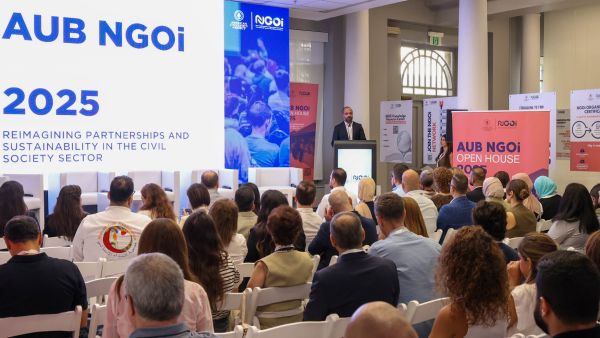Non-Governmental Organizations Initiative at AUB Hosts Open House for Over 150 NGOs

The Non-Governmental Organizations Initiative (NGOi) at the American University of Beirut (AUB) hosted its annual “Open House 2025: Reimagining Partnerships and Sustainability in the Civil Society Sector” at AUB’s West Hall. The full-day event served as a dynamic platform for exhibition, dialogue, workshops, and networking, bringing together more than 150 local and international NGOs from Lebanon and the region, alongside a vibrant network of civil society actors, donors, embassy representatives, and academics.
The event opened with welcoming remarks by Dr. Shadi Saleh, founding director of NGOi, who reflected on the initiative’s six-year evolution into a regional hub for civil society development in the MENA region. Saleh emphasized the power of partnerships as the foundation for strengthening the sector, and underscored the responsibility of academic institutions to support civil society in times of challenge and change. He reaffirmed NGOi’s unwavering commitment to advancing resilience, fostering collaboration, and driving sustainable impact across the MENA region.
Following the opening, participants joined a panel discussion titled “Reimagining Partnerships: Building an Institutionally Strong and Sustainable Civil Society Ecosystem.” Moderated by NGOi Manager Alaa Merhi, the discussion featured Ambassador of Finland to Lebanon Anne Meskanen; Wael Darwish, country director of Caritas Switzerland in Lebanon and Syria; Maya Ibrahimchah, founder and president of Beit El Baraka and Beit Kanz; and Dr. Tania Haddad, associate professor at AUB. The discussion examined the shifting landscape in the sector, the need for diversified and sustainable funding, the centrality of localization and community-led action, the importance of adaptability and innovation, and the role of academia in linking practice to evidence and institutionalizing change.
Throughout the day, an exhibition showcased the work of thirty organizations from Lebanon, Kuwait, Turkey, and Syria, spotlighting their achievements and community impact while creating opportunities to connect with donors, peers, and experts. In parallel, a gallery walk presented NGOi’s services and offerings, while interactive activities and networking sessions infused the event with energy and collaboration, encouraging meaningful exchanges among participants.
The day also featured three interactive workshops addressing key dimensions of NGO capacity building. Sessions explored strategies to map and sustain effective partnerships, reduce funding dependency, ensure financial resilience, and strengthen communication and branding to enhance visibility, credibility, and long-term growth.
The “NGOi Open House 2025” brought together diverse actors from across the civil society landscape to exchange ideas, share experiences, and build connections. Through exhibitions, panel discussions, and workshops, the event reaffirmed the crucial contribution of NGOs to regional development and emphasized the importance of partnerships in amplifying their impact.
Background Information
American University of Beirut
Founded in 1866, the American University of Beirut is a teaching-centered research university based on the American liberal arts model of higher education. AUB has over 9,000 students and over 1,200 instructional faculty members. The University encourages freedom of thought and expression and seeks to graduate men and women committed to creative and critical thinking, lifelong learning, personal integrity, civic responsibility, and leadership.






